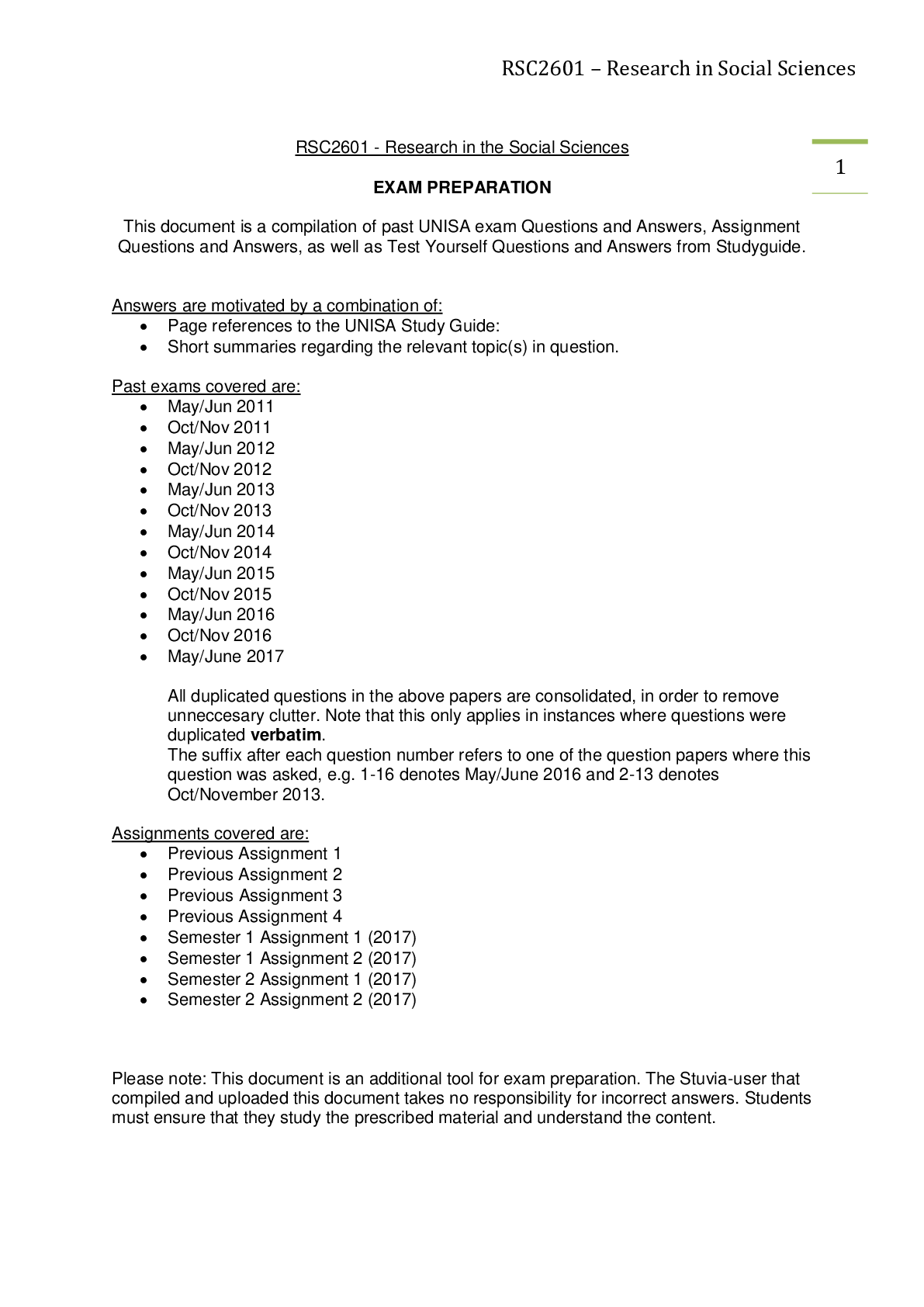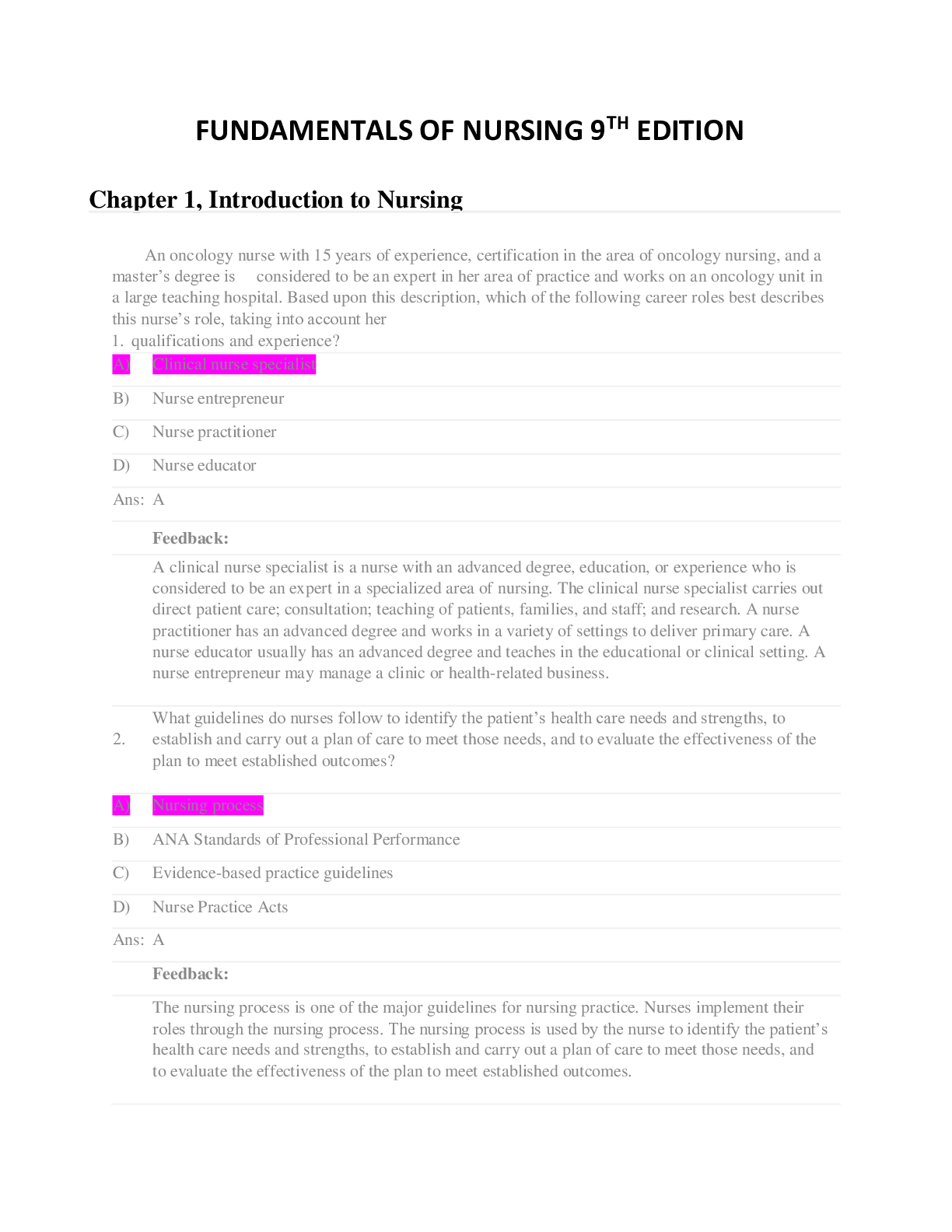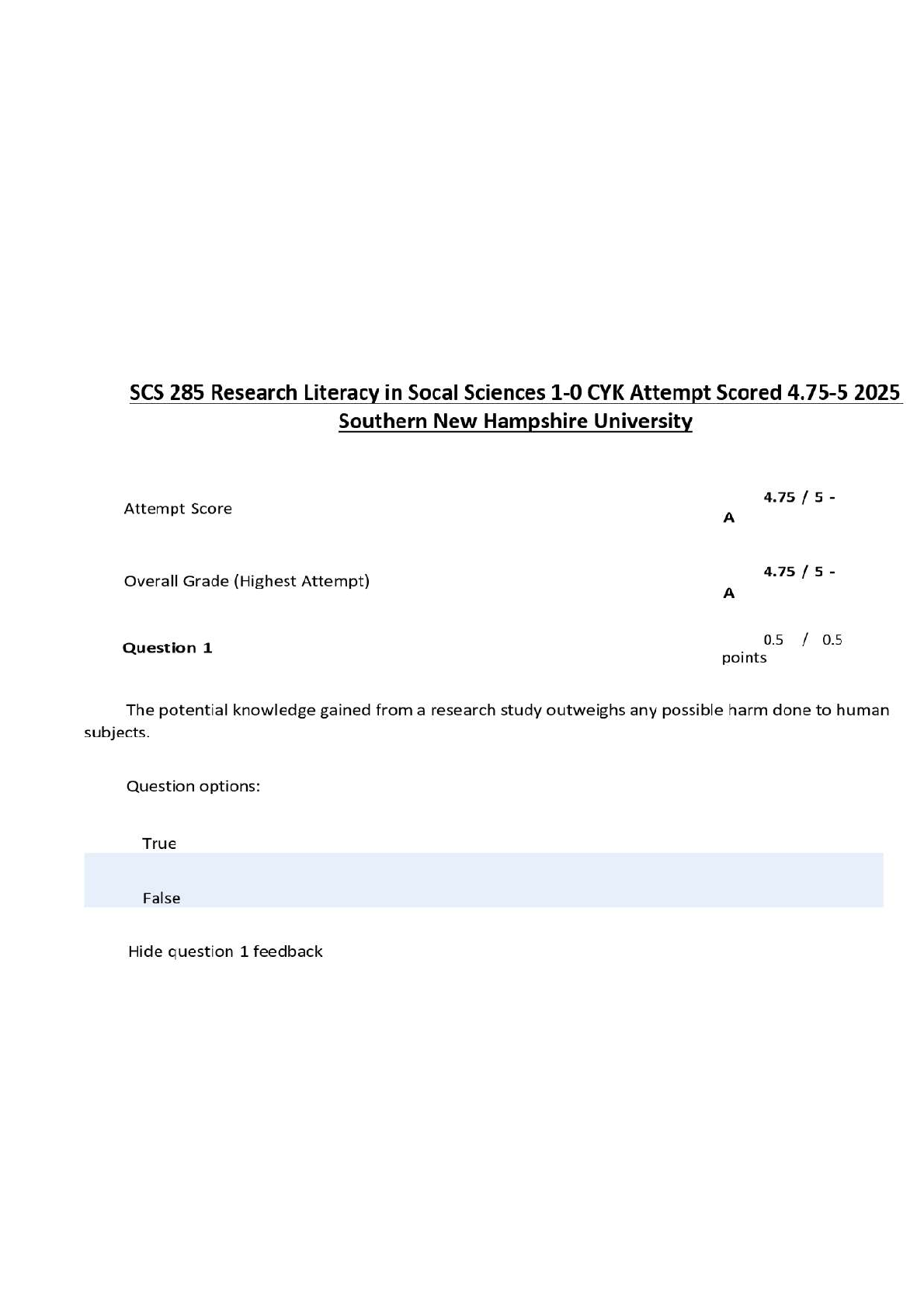Social Sciences > EXAM > RSC2601 – Research in Social Sciences RSC2601 - Research in the Social Sciences 1 EXAM PREPARATION (All)
RSC2601 – Research in Social Sciences RSC2601 - Research in the Social Sciences 1 EXAM PREPARATION
Document Content and Description Below
RSC2601 – Research in Social Sciences RSC2601 - Research in the Social Sciences 1 EXAM PREPARATION This document is a compilation of past UNISA exam Questions and Answers, Assignment Questions ... and Answers, as well as Test Yourself Questions and Answers from Studyguide. Answers are motivated by a combination of: Page references to the UNISA Study Guide: Short summaries regarding the relevant topic(s) in question. Past exams covered are: May/Jun 2011 Oct/Nov 2011 May/Jun 2012 Oct/Nov 2012 May/Jun 2013 Oct/Nov 2013 May/Jun 2014 Oct/Nov 2014 May/Jun 2015 Oct/Nov 2015 May/Jun 2016 Oct/Nov 2016 May/June 2017 All duplicated questions in the above papers are consolidated, in order to remove unneccesary clutter. Note that this only applies in instances where questions were duplicated verbatim. The suffix after each question number refers to one of the question papers where this question was asked, e.g. 1-16 denotes May/June 2016 and 2-13 denotes Oct/November 2013. Assignments covered are: Previous Assignment 1 Previous Assignment 2 Previous Assignment 3 Previous Assignment 4 Semester 1 Assignment 1 (2017) Semester 1 Assignment 2 (2017) Semester 2 Assignment 1 (2017) Semester 2 Assignment 2 (2017) Please note: This document is an additional tool for exam preparation. The Stuvia-user that compiled and uploaded this document takes no responsibility for incorrect answers. Students must ensure that they study the prescribed material and understand the content. RSC2601 – Research in Social Sciences The correct answer is (4) SG p5 But the problem with relying on authority is that we can overestimate the expertise of persons in authority: in other words, experts can be wrong. When we do not know how the experts arrived at their knowledge, we should be careful in accepting their conclusions. Therefore 1) is incorrect. A person in a position of authority is likely to have earned that authority by his or her experience and may therefore be able to offer us reliable knowledge. In other words, that person has spent time and effort learning something and others can benefit from this. Therefore 2) and 3) is incorrect. The correct answer is (2) SG p9 Overgeneralisation may lead to selective observation. Once the decision is made that events are following a particular pattern, and you think you know why, you will tend to pay attention mainly to future situations that correspond with that pattern. You will also tend to overlook the situations that conflict with the pattern. The correct answer is (1) SG p8 Media Myths: The mass media, including television, films, newspapers and magazines and, most recently, the Internet, have a powerful influence on knowledge. Most people learn EXAM QUESTIONS 2 QUESTION 1 (1-11) A person of high academic standing is given the task by the local government to investigate the best ways of ensuring participation of people living in a small town in an agricultural development project. Being of her high status, she speaks with authority. The research results obtained by this person must be: 1) accepted unquestioningly because of the high academic standing of the researcher 2) rejected because authority is not a valid way to gain knowledge 3) rejected because participation is a form of common sense knowledge 4) accepted if it withstands critical scrutiny QUESTION 2 (1-11) The different accounts of people having witnessed a car accident can be ascribed to: 1) overgeneralisation 2) selective observation 3) ego involvement 4) stress QUESTION 3 (1-11) People's dependence on media presentations for understanding the impact of, for example, sophisticated communication technology on their daily lives, is an example of . 1) media myths. 2) authonty 3) mythical Interpretation of technology. 4) scepticism towards technology. RSC2601 – Research in Social Sciences The correct answer is (1) SG p20 “We shall explain epistemology in the context of the social sciences with reference to the following epistemological question: “Can social reality (things such as groups, societies, norms, organisations) be studied in the same way as natural reality (things such as atoms, bodies, viruses, planets?” Ontology involves assumptions which refer to what researchers think exists and is real, eg. A rectangle has 4 sides. Option 2 – 5 refer to ontological statements. Epistemology deals with how we can know and explain something, i.e. one can calculate the area of a rectangle with a formula. The correct answer is (5) SG p25 “Interpretivists argue that social reality is inherently meaningful. People have the ability to interpret a situation and decide how to act in response to this situation. By consciously participating in a situation, they attribute meaning to that situation. Meaning is constructed through human beings interacting with each other and playing a central role in defining a situation to make sense of it” Options 1, 2 and 4 refer to attributes of positivism. Option 3 relates to explanatory research. QUESTION 4 (1-11) Identify the epistemological statement: 1) social reality and natural reality can be studied in the same way 2) social reality is inherently meaningful 3) human beings are reflexive 4) patriarchy is common in traditional societies 5) hidden structures mask the true nature of social reality QUESTION 5 (1-11) Research on juvenile delinquency would be regarded and interpretive if it: 1) establishes a crucial relationship between juvenile delinquency and poverty 2) treats juvenile delinquency as a fact 3) provides reasons for juvenile delinquency 4) focuses on causation rather than description 5) treats juvenile delinquency as a construction of meaning QUESTION 6 (1-11) In the context of positivism, value freedom implies that: a) values are not important by positivists to research b) positivists distance themselves in research from their own values 3 about the world and develop their concept of social reality according to what they see, hear and read in the media. However, as Neuman (1997) points out, the chief purpose of the media is to entertain, not to present reality accurately. Writers who adapt real life for television shows and films scripts distort reality, often relying on tradition, authority or common sense. Writers for newspapers and magazines have deadlines which limit their information and they cannot be specialists in every topic they write about. Mistakes may be made from ignorance. Public thinking can be changed by selective emphasis, and this, in turn, can lead people into error. Stuvia.com - The study-notes marketplace RSC2601 – Research in Social Sciences Downloaded by: mosa123 | thahanem@gmail.com Distribution of this document is illegal The correct answer is (4) SG p22, 23 “We start with how positivists see the nature of social reality. Positivists believe that social reality can be discovered. Positivists claim it is crucial that researchers approach social reality in a neutral, value-free, detached and systematic way. Methodological tools are developed to collect evidence that is observable and hence measurable. Standardised procedures are followed to study particular events and learn about their interconnections. value-freedom: researchers’ personal values do not influence the collection of data (research)” The correct answer is (3) Here, theory is equated to speculation. To recap: concepts identify and describe phenomena. SG p50, 55, 56, 58 The scope of a theory is linked to the level of abstraction achieved by the concepts in the theory (the building blocks of the theory). The higher the level of abstraction, the more the theory can be generalised and the wider its applicability. Theory deductively guides research, while the information obtained through research inductively builds theory. Theory and research are therefore inseparable (Cohen 1989:22) c) objective findings can be made about social reality d) the values of the positivist must take precedence in the research process 4 e) objectivity is pursued by using standardized research procedures 1) a), c), e) 2) a), d), e) 3) b), c), d) 4) b), c), e) 5) c), d), e) QUESTION 7 (1-11) Which of the following statements are true with regard to theories in the social sciences? a) theories can describe or explain a phenomenon b) theories are broader in scope than approaches c) the level of abstraction of theories can differ d) theories guide research e) theories are speculations 1) a), b), c) 2) a), b), d) 3) a), c), d) 4) a), c), e) 5) b), c), d) QUESTION 8 (1-11) Which of the following concepts reflects the highest level of abstraction? 1) age 2) gender Stuvia.com - The study-notes marketplace RSC2601 – Research in Social Sciences Downloaded by: mosa123 | thahanem@gmail.com Distribution of this document is illegal The correct answer is (3) SG p55, 56 The scope of a theory is linked to the level of abstraction achieved by the concepts in the theory (the building blocks of the theory). The higher the level of abstraction, the more the theory can be generalised and the wider its applicability. The opposite of abstract is concrete. The difference between abstract and concrete concepts can be compared to a view of a town from 10 kilometres in the sky and one that is seen up close. Abstract concepts allows us to get the big picture, but does not show much detail, whereas concrete concepts presents the close-up view and allows us to focus on specific cases. The correct answer is (3) SG p58 Theory deductively guides research, while the information obtained through research inductively builds theory. Therefore a) is incorrect and c) correct. Also, b) is incorrect, and d) correct. Deductiion entails moving from general to specific. Inductive moves from specific to general. The correct answer is (4) SG p78 See 2.3.4. The first three statements are all incorrect. In causal relationships “negative” and “positive” imply the direction of the relationship between two variables. If a relationship is “positive”, both variables change in the same direction. An example is: the higher the population density, the higher the crime rate. A negative relationship implies changes in different directions. An example here is: the higher the rate of immunisation, the lower the infant mortality rate. 3) alienation 4) educational level 5 5) income QUESTION 9 (1-11) Which of the following statements are true? a) theory inductively guides research b) research deductively builds theory c) theory deductively guides research d) research inductively builds theory 1) a), b) 2) b), c) 3) c), d) 4) a), c) 5) b), d) QUESTION 10 (1-11) If a negative relationship exists between variables in a hypothesis, it implies that: 1) the two variables are not related 2) as the value of one variable decreases, the other variable also decreases in value 3) there is only a weak relationship between the two variables 4) as the value of one variable decreases, the other value increases in value QUESTION 11 (1-11) [Show More]
Last updated: 2 years ago
Preview 1 out of 236 pages

Buy this document to get the full access instantly
Instant Download Access after purchase
Buy NowInstant download
We Accept:

Reviews( 0 )
$7.00
Can't find what you want? Try our AI powered Search
Document information
Connected school, study & course
About the document
Uploaded On
Apr 13, 2021
Number of pages
236
Written in
Additional information
This document has been written for:
Uploaded
Apr 13, 2021
Downloads
0
Views
215




.png)










